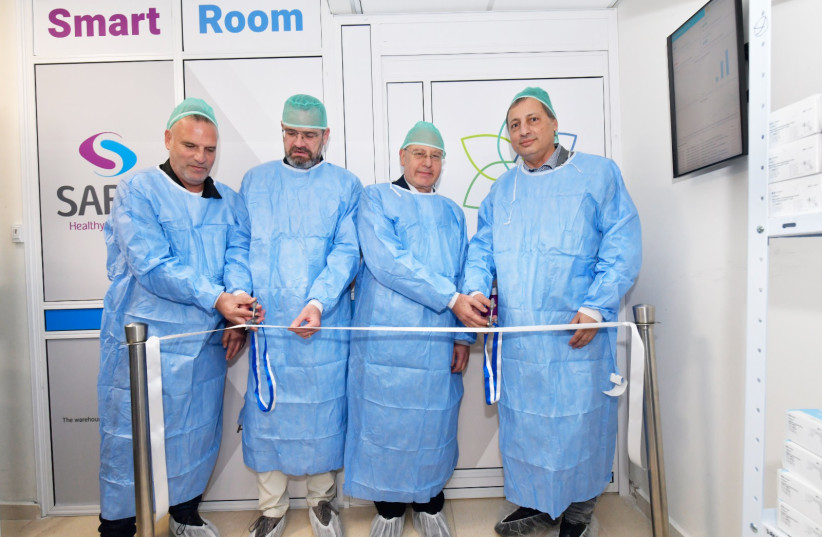A “smart room” for managing inventory in operating rooms – the first of its kind in the world – has been established at the Galilee Medical Center in Nahariya.
Launched by the Autonomi company in cooperation with Sarel, Israel’s Group Purchasing Organization (GPO) for government hospitals, the operating room includes a unique system for inventory management. The room will lead to the optimization of the work of Galilee Medical Center’s operating room team and lead to savings of up to 15% of the costs of medical equipment and drugs per year, the hospital said.
Autonomi is dedicated to transforming outmoded, inefficient supply tracking into state-of-the-art, autonomous inventory management systems; increased efficiency to ensure the right supplies are in the right place and at the right time; reduced wastage and misuse and real-time, accurate inventory reporting and analytics. It also tracks inventory usage per procedure to manage budgets and billing more effectively; prevents the running out of critical supplies and reorders automatically; conducts patient-safety recalls in real time; and issues automated warnings for upcoming expiration dates.
What are the benefits to the new operating room?
The company's “groundbreaking” technology reduces dependence on hospital staff and performs processes autonomously without human assistance, both on the part of the medical staff and the providers. The technology enables tracking items assigned to a medical team and a medical case, without the help of an end user, leading to the optimization of hospital resources. The system's capabilities are measured by the ability to “close the loop” from when medical equipment enters the medical center until its final use, which even includes implantation in a patient's body.
Inventory management in medical institutions in general and operating rooms, in particular, is complex, with many details. It requires many person-hours to keep it going. Medical equipment worth millions of shekels (about 15% on average of the medical equipment and medicines in the hospitals) is thrown away or lost as a result of over-ordering, and sometimes medical procedures are postponed due to a lack of stock in real-time.

The festive event opened with congratulatory words from the participants, after which Autonomi CEO Yoav Kestel and Sarel's CEO, Avi Buskila. Prof. Masad Barhoum, director-general of the Galilee Medical Center, cut the ribbon.
“After years of developing systems for managing prescription drug inventory for the American market, we moved to the next level and expanded the system to manage medical equipment inventory in medical institutions in general and operating rooms in particular,” said Kestel. Inventory management is often complex, manual, and prone to errors Autonomous technology, based on layers of technology, allows modular application of the system according to the space and the medical equipment intended for management. The assimilation occurs in an existing space without the need to establish a new infrastructure of storage systems and without the need for gluing and manual marking of items.”
Buskila added that “our company’s mission is to enable hospitals to treat patients optimally and to promote breakthrough technologies to streamline the supply in hospitals. Through the autonomous system, the medical staff can treat patients efficiently and provide them with better service. We consider it a great privilege to be the first to lead such technology in Israel and are convinced that more hospitals will want to adopt it in order to advance today's work processes.”
“As the director of a leading medical center, I believe that to be first creates an obligation, and I am happy that we were chosen to be the first in the world to inaugurate this smart operating inventory room,” Barhoum concluded. “Using the latest technology will bring about extraordinary efficiency, saving resources and personnel.”
